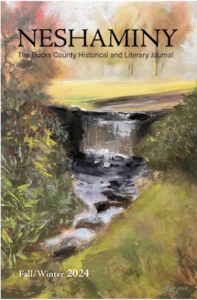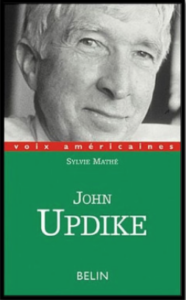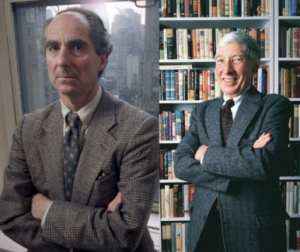Writer Clyde Haberman posted on social media yesterday that the death at age 92 of André Soltner, “the great chef who presided over Lutece in New York,” reminded him of a lunch he had there with John Updike.
“In 1996 I interviewed John Updike there, a restaurant he chose because it was near his publisher, Knopf. ‘There was sort of a symbiosis between the Knopf editorial board and Lutece,’ Updike said. Then he added, ‘I’ve never felt comfortable in here. I feel gourmet food is sort of wasted on me.'”
In “At Lunch With/John Updike; On Reading, Writing and Rabbit,” which appeared in The New York Times on March 6, 1996, Haberman wrote, “A sandwich and a glass of cranberry juice will do for lunch when [Updike] is at home, on 11 isolated acres in Beverly Farms, Mass., about 25 miles north of Boston. At this point, Mr. Updike said, he has to watch his waistline almost as much as his language.
“‘There’s no disguising the fact that a writer’s life is a sedentary one and prone to incessant snacking if you work at home,’ he said. ‘The little break of going down to get another oatmeal cookie is almost irresistible. So I try to make up for the cookies by not eating much at lunch.’
“Even when he was a boy in Shillington, Pa., outside the working-class town of Reading, literature and food converged. ‘I was a great peanut-butter lover from childhood on,’ he recalled. ‘The way I used to read was, we had an old sofa in the house, and I’m make a sandwich consisting of peanut butter and raisins. You’d eat one of those while you read John Dickson Carr or some other mystery writer, or James Thurber of Robert Benchley. In that way, many a happy afternoon went by.'”
Despite Updike’s talk of watching his caloric intake, Haberman wrote, “Let it be noted that he held up fine under the gustatory strain of Lutece, polishing off a serving of grouper after a cup of pumpkin soup and a puff pastry of sweetbreads and spinach. He did draw the line at dessert.”
In his 1-19-25 social media post, Haberman remarked, “That lunch with Updike . . . was one of those times when I enjoyed myself thoroughly and marveled that I actually got paid for such moments. I felt the same after interviewing Umberto Eco in Bologna a few years earlier.”
 Updike Society member Lang Zimmerman was reading Salman Rushdie’s Knife: Meditations After an Attempted Murder (Random House, 2024) when he came upon a second-chapter account of the birth of the PEN America World Voices Festival:
Updike Society member Lang Zimmerman was reading Salman Rushdie’s Knife: Meditations After an Attempted Murder (Random House, 2024) when he came upon a second-chapter account of the birth of the PEN America World Voices Festival:
 Jeff Werner, of
Jeff Werner, of  Ditum reminded readers of the impetus behind Updike’s writing of the novel: “Jack Kerouac’s On the Road came out in 1957, and without reading it, I resented its apparent injunction to cut loose; Rabbit, Run was meant to be a realistic demonstration of what happens when a young American man goes on the road—the people left behind get hurt. There was no painless dropping out of the Fifties’ fraying but still tight social weave.”
Ditum reminded readers of the impetus behind Updike’s writing of the novel: “Jack Kerouac’s On the Road came out in 1957, and without reading it, I resented its apparent injunction to cut loose; Rabbit, Run was meant to be a realistic demonstration of what happens when a young American man goes on the road—the people left behind get hurt. There was no painless dropping out of the Fifties’ fraying but still tight social weave.” Chase Replogle, pastor of Bent Oak Church in Springfield, Mo., posted a chapter excerpt that didn’t make the final cut of his book, A Sharp Compassion. “I think it still matters, he wrote. “It is taken from the chapter on affirmation and examines how the church has been tempted to avoid what offends.”
Chase Replogle, pastor of Bent Oak Church in Springfield, Mo., posted a chapter excerpt that didn’t make the final cut of his book, A Sharp Compassion. “I think it still matters, he wrote. “It is taken from the chapter on affirmation and examines how the church has been tempted to avoid what offends.” John Updike Society board member Sylvie Mathé was profiled in the series “Persistence of Character — Major interview: Archaeology of a journey” in e-Rea, electronic journal of studies on the English-speaking world. The series, published in French, tracks the breadth of an entire career of distinguished intellectuals, including early influences. An English translation exists in PDF form, but in a file to big to upload and no link to share. Here is the link to a French version online:
John Updike Society board member Sylvie Mathé was profiled in the series “Persistence of Character — Major interview: Archaeology of a journey” in e-Rea, electronic journal of studies on the English-speaking world. The series, published in French, tracks the breadth of an entire career of distinguished intellectuals, including early influences. An English translation exists in PDF form, but in a file to big to upload and no link to share. Here is the link to a French version online:  Mathé talks about the full trajectory of her career, including the experience of spending her senior year in high school in Rock Island, Ill. “Compared to my final year in French, the amount of work was nothing like it was, nor the demands of the homework,” she told the interviewer. She shared that her host family was “extremely puritanical,” with the mother “surprised, even horrified, that I had read texts by Hemingway, or Sanctuary by Faulkner…It must be said that 1968 in a small town in Illinois was still the 50s. It had nothing to do with what was happening on campuses at the same time, with women’s lib, demonstrations against the Vietnam War, for civil rights, etc.” In summary, “Let’s say that compared to my final year in French, or my life in France, which was essentially focused on high school, work and success, it was a much more varied life, more entertaining…I was doing things I had never done before: I was caught up in the rhythm, I went to matches according to the football, basketball, baseball seasons,” and she dated, went to parties where there was drinking and marijuana brownies, and was generally inducted into American culture.
Mathé talks about the full trajectory of her career, including the experience of spending her senior year in high school in Rock Island, Ill. “Compared to my final year in French, the amount of work was nothing like it was, nor the demands of the homework,” she told the interviewer. She shared that her host family was “extremely puritanical,” with the mother “surprised, even horrified, that I had read texts by Hemingway, or Sanctuary by Faulkner…It must be said that 1968 in a small town in Illinois was still the 50s. It had nothing to do with what was happening on campuses at the same time, with women’s lib, demonstrations against the Vietnam War, for civil rights, etc.” In summary, “Let’s say that compared to my final year in French, or my life in France, which was essentially focused on high school, work and success, it was a much more varied life, more entertaining…I was doing things I had never done before: I was caught up in the rhythm, I went to matches according to the football, basketball, baseball seasons,” and she dated, went to parties where there was drinking and marijuana brownies, and was generally inducted into American culture. Mathé’s introduction to John Updike came when she went to Oxford and studied “Puritanism in John Updike’s Fiction” with Jeanne-Marie Santraud, “who was the only Americanist at Paris IV.” She would go on to write her master’s thesis on Updike and compose a monograph for the American Voices series edited by Marc Chénetier titled John Updike: Nostalgia for America.
Mathé’s introduction to John Updike came when she went to Oxford and studied “Puritanism in John Updike’s Fiction” with Jeanne-Marie Santraud, “who was the only Americanist at Paris IV.” She would go on to write her master’s thesis on Updike and compose a monograph for the American Voices series edited by Marc Chénetier titled John Updike: Nostalgia for America. On the American Literature public Facebook group, Milan Milan Stankovic posted a consideration/comparison of two “Great American Writers” whose works offer “profound insights into American society, culture, and individual psychological and individual psychological complexities”: John Updike and Philip Roth.
On the American Literature public Facebook group, Milan Milan Stankovic posted a consideration/comparison of two “Great American Writers” whose works offer “profound insights into American society, culture, and individual psychological and individual psychological complexities”: John Updike and Philip Roth. Edwin Woodruff, who was given a copy of Gertrude and Claudius by a cast member when he directed the play for community theater, wrote in a Patheos column that while he found Updike’s sequel to Shakespeare’s Hamlet “a bit offputting” in the beginning, with a style that “seemed stilted and awkward and the analysis of everyone’s motivations and thoughts rather labored and obvious. But it grew on me as it went on.
Edwin Woodruff, who was given a copy of Gertrude and Claudius by a cast member when he directed the play for community theater, wrote in a Patheos column that while he found Updike’s sequel to Shakespeare’s Hamlet “a bit offputting” in the beginning, with a style that “seemed stilted and awkward and the analysis of everyone’s motivations and thoughts rather labored and obvious. But it grew on me as it went on. Dr. Carla Alexandra Ferreira, a Brazilian scholar whose YouTube channel is “Carla Ferreira: Literary Dialogues,” has featured brief discussions of two John Updike novels:
Dr. Carla Alexandra Ferreira, a Brazilian scholar whose YouTube channel is “Carla Ferreira: Literary Dialogues,” has featured brief discussions of two John Updike novels:  “We float above events, seeing them from the perspective of different characters, sometimes switching viewpoint over the space of a paragraph,” Jones wrote. “Rabbit, Run expresses a desire to transcend ordinary life, while also suggesting—in the manner of Ecclesiastes—that the only meaningful escape available to us lies in ordinary things. In the end, Rabbit, Run does not promise any kind of silly nirvana, but it does suggest a more liberating and interesting way of looking at the non-nirvana in which we spend our days.”
“We float above events, seeing them from the perspective of different characters, sometimes switching viewpoint over the space of a paragraph,” Jones wrote. “Rabbit, Run expresses a desire to transcend ordinary life, while also suggesting—in the manner of Ecclesiastes—that the only meaningful escape available to us lies in ordinary things. In the end, Rabbit, Run does not promise any kind of silly nirvana, but it does suggest a more liberating and interesting way of looking at the non-nirvana in which we spend our days.”